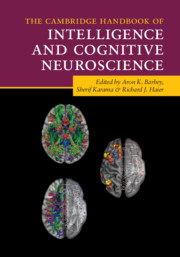Book contents
- The Cambridge Handbook of Intelligence and Cognitive Neuroscience
- Reviews
- The Cambridge Handbook of Intelligence and Cognitive Neuroscience
- Copyright page
- Dedication
- Contents
- Figures
- Tables
- Contributors
- Preface
- Part I Fundamental Issues
- Part II Theories, Models, and Hypotheses
- Part III Neuroimaging Methods and Findings
- Part IV Predictive Modeling Approaches
- 16 Predicting Individual Differences in Cognitive Ability from Brain Imaging and Genetics
- 17 Predicting Cognitive-Ability Differences from Genetic and Brain-Imaging Data
- Part V Translating Research on the Neuroscience of Intelligence into Action
- Index
- References
16 - Predicting Individual Differences in Cognitive Ability from Brain Imaging and Genetics
from Part IV - Predictive Modeling Approaches
Published online by Cambridge University Press: 11 June 2021
- The Cambridge Handbook of Intelligence and Cognitive Neuroscience
- Reviews
- The Cambridge Handbook of Intelligence and Cognitive Neuroscience
- Copyright page
- Dedication
- Contents
- Figures
- Tables
- Contributors
- Preface
- Part I Fundamental Issues
- Part II Theories, Models, and Hypotheses
- Part III Neuroimaging Methods and Findings
- Part IV Predictive Modeling Approaches
- 16 Predicting Individual Differences in Cognitive Ability from Brain Imaging and Genetics
- 17 Predicting Cognitive-Ability Differences from Genetic and Brain-Imaging Data
- Part V Translating Research on the Neuroscience of Intelligence into Action
- Index
- References
Summary
The study of intelligence, or general cognitive ability, is one of the earliest avenues of modern psychological enquiry (Spearman, 1904). A consistent goal of this field is the development of cognitive measures that predict real-world outcomes, ranging from academic performance, health (Calvin et al., 2017), and psychopathology (Woodberry, Giuliano, & Seidman, 2008), to mortality and morbidity rates (Batty, Deary, & Gottfredson, 2007). Despite evidence linking intelligence with a host of important life outcomes, we remain far from a mechanistic understanding of how neurobiological processes contribute to individual differences in general cognitive ability. Excitingly for researchers, advances in predictive statistical modeling, the emergence of well-powered imaging and genetic datasets, and a cultural shift toward open access data may allow for behavioral prediction at the level of a single individual (Miller et al., 2016; Poldrack & Gorgolewski, 2014).
- Type
- Chapter
- Information
- Publisher: Cambridge University PressPrint publication year: 2021

